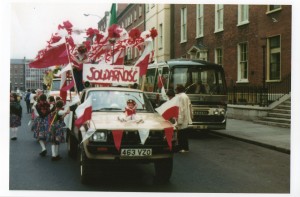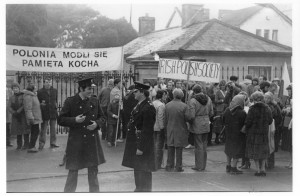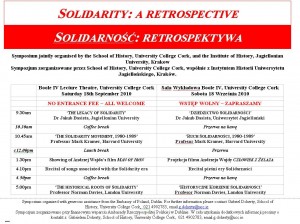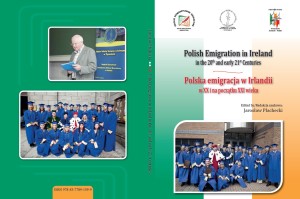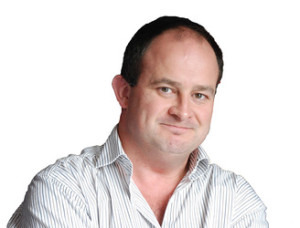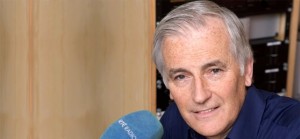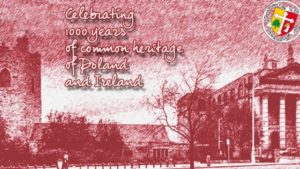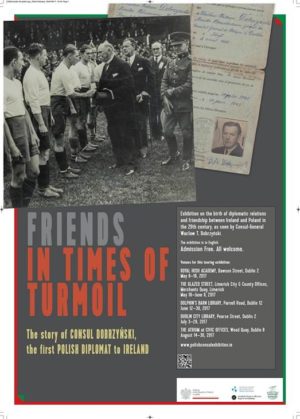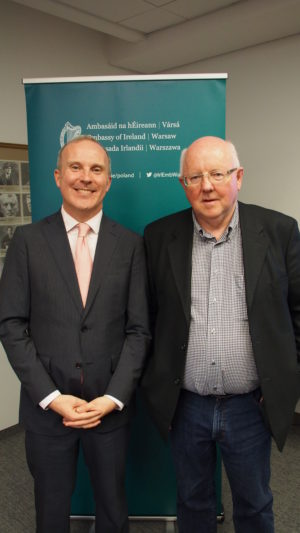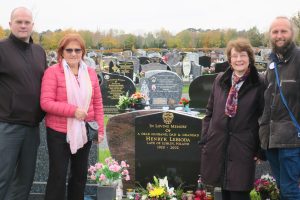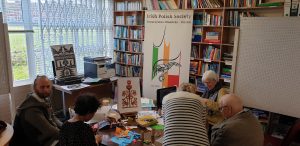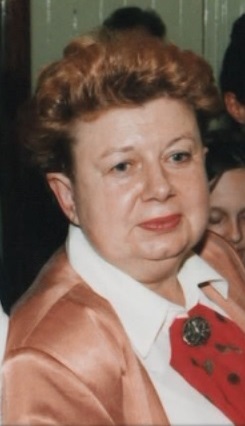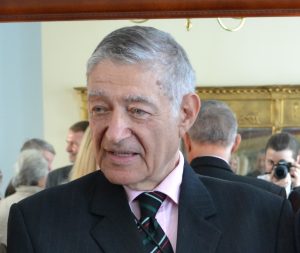 The Committee of 12 members elected on 12th October 2008 had 10 meetings altogether (7 Nov, 5 Dec, 9 Jan, 6 Feb, 6 March, 3 April, 8 May, 5 June, 3 July, 4 Sept,). There was one-month break in August for summer holiday. However, during August some members of the Committee did some research and administrative work in relation to the Society.
The Committee of 12 members elected on 12th October 2008 had 10 meetings altogether (7 Nov, 5 Dec, 9 Jan, 6 Feb, 6 March, 3 April, 8 May, 5 June, 3 July, 4 Sept,). There was one-month break in August for summer holiday. However, during August some members of the Committee did some research and administrative work in relation to the Society.
We sent out 10 bulletins (bi-lingual newsletters) to members and friends. Apart from newsletters additional information for all the events was given with the help of the Forum Polonia website. The information was also put on the notice board in the Polish House.
There were some 15 or so events organized in line with the purpose of the Society which is: “to promote greater mutual interest and understanding between the Irish and the Polish communities through social and cultural activities and to promote, sponsor, teach, study, advance and encourage interest in and knowledge of the culture, history, peoples, language and traditions generally of Poland and the Polish people”.
THE THEMES OF OUR EVENTS COVERED:
(1) History of Poland. (26th April- A talk given by dr Jacqueline Hayden, Trinity College, to mark 20th anniversary of so-called Round Table talks and the collapse of Communism in Poland. The Polish Ambassador, and Prof Ron Hill of TCD attended, and took part in the discussion;
17th May-A talk by Paul McNamara based on his book “Sean Lester, Poland and the Nazi takeover of Danzig- an Irishman’s diary”;
(2) Poetry and literary events. “Tribute to the Poetry of Zbigniew Herbert”- a reading by Seamus Heaney in the Writers’ Centre on 16th October 2008- this event was organized by our Society in association with the Ireland-Poland Cultural Foundation and the Embassy of Poland;
29th May 2009 – The launch of the Polish issue of ‘Shamrock Haiku Journal’;
11th Sept – “Country of the Mind”, a concert based on the poetry by Adam Mickiewicz; (3)Traditions of Poland and Polish people.
Celebration of Polish National Holidays: Poland’s Independence Day celebrated on 14th Nov with presentation by Maciej Smolenski of his father’s book; 3rd May Constitution Day – a concert of Polish patriotic songs;
Traditional Christmas celebration ‘Wigilia’ with Polish Christmas carols and traditional Polish food;
(4) Visual Arts. 19th Feb – “Casimir Markiewicz: portrait of the artist”- a lecture with slides given by art historian, Ms Wanda Smolin;
14th June – An artistic experience – Ceramic Workshop given by a well known ceramic artist, Orla Kaminska;
22June- 3rd July 2009 – a major Art Exhibition, in Dublin City Council Civic Offices, Dublin. Works by 14 artists, members of IPS. Main organizer: Marysia Harasimowicz.
The exhibition was opened by the Polish Ambassador;
(5)Music – A number of concerts of “Songs and Ballads” took place. ( 23rd Nov 2008 in Navan, St Mary’s Church of Ireland ; 15th Feb 2009 in St Audoen RC Church, Dublin; and two major concerts in June 2009, in Poland – in Jablonna near Warsaw and in Suwalki).
All concerts organized and given by our Society members: Maciej Smolenski-bas baritone, Grainne Thomas-soprano, Rosemary Hill-piano. A trip to Poland was organized in June in conjunction with the concerts.
(6)To promote greater mutual interest and understanding between the Irish and the Polish people
On 19th Oct 2008 the Society hosted a group of 18 people from the “Constance Markiewicz” School, Warsaw, Poland – 16 pupils and 2 teachers– they were on a six-day trip to Dublin, Sligo and Lissadell House; their trip was filmed and shown on the RTE news.
On 15th March – St Patrick’s celebrations at the Polish House with traditional Irish music.
Due to circumstances beyond the Society’s control some of our projects were not carried out. For example the exhibition in the EU House, depicting the Society’s activity during the time of the Communist regime in Poland, which was planned for October, has been postponed till a later date.
IPS COMMITTEE’S WORK ON VARIOUS ISSUES/EVENTS OUTSIDE IPS, BUT ON BEHALF OF OUR SOCIETY AND IN THE INTEREST OF IT.
* Members of IPS Committee were actively involved in meetings and affairs of Forum Polonia (a network of Polish groups and individuals). Particularly significant was the chairman’s involvement in connection with the Local and European elections.
* Hon.secretary represented the Irish Polish Society at a special Jubilee Meeting of EUWP (European Union of Polish Communities) which took place in Berlin, 28 – 30 Nov. 2008.
* Krzysztof Kiedrowski represented IPS during Polish Cultural Festival in Cork, Nov.2008.
* Agnieszka-Ginger Krauze represented IPS at NOEMP (Independent European Polish Youth Organization) meeting in Belfast.
* Three Committee members (Sebastian Widel, Hanna Dowling, Ginger- Agnieszka Krauze) took part in a Conference in London (29-31 May, 2009). The Conference was organized by EUWP and Federation of Poles in Great Britain in cooperation with Polish Ministry of Foreign Affairs and ‘Wspolnota Polska’. The subject matter of the Conference ‘Monitor Emigracji Zarobkowej – 2009’, were problems faced by the recent Polish migrants within the European Union.
*Three members of IPS Committee (Jan Kaminski, Hanna Dowling, Sebastian Widel) helped a group of 33 Poles (staff of Polish Public Employment Service) who were on an educational trip in Ireland, in July 2009. A letter of thanks/appreciation was sent to the secretary from the organizers of the trip (Academy for Training & Competences, Krakow, Poland).
The membership of IPS slightly increased in 2009.
HISTORY OF THE IRISH POLISH SOCIETY
The Irish Polish Society is a voluntary, non-profit-making and
non-political or- ganization. Its main aim is to foster Polish culture and
traditions in Ireland and to promote links between Irish and Polish
people.
The election of a Polish Pope inspired Poles in Dublin to form the Irish
Polish Society, and on 7th January 1979 the first steering committee of IPS
was set up. The Pope’s visit to Ireland (29th September – 1st October
1979) united us even more, and on 30th Septem- ber 1979 a historic meeting
between the Pope and His fellow countrymen took place in the Papal
Nunciature in Dublin.
After the imposition of Martial Law in Poland on 13th December 1981, the
Irish Polish Society began actively lobbying for democratic changes in
Poland. The Society also managed to organise substantial aid to Poland with
the help of their Irish friends. Some twenty containers with food,
medicines and clothes were shipped from Dublin to Poland.
The meetings and gatherings of Poles and their families and friends used to
take place in Milltown College, where the Society’s founder, Fr Klaus
Cieszynski, was then a student.
Thanks to a generous legacy from the estate of Wanda Petronella Brown, a
Polish lady who married an Irishman, a large Georgian building at 20
Fitzwilliam Place, Dublin 2, was purchased in 1986. This became the home of
the Irish Polish Society.
A new chapter in the development of Irish Polish relations began with the
collapse of the Communist system in Poland, and in 1991 the Irish Polish
Society established contacts with the newly open Embassy of the Polish
Republic in Ireland.
The purpose for which the Society is established is to promote greater
mutual interest and understanding between the Irish and Polish
communities through social and cultural activities and to promote, sponsor,
teach, study, advance and encourage interest in and knowledge of the
culture, history, peoples, language and traditions generally of Poland and
Polish people. The Society organizes lectures, concerts, art exhibitions,
literary events, discussions, social gatherings and other cultural,
educational and traditional events. Membership is open to all who live on
the island of Ireland and have an interest in Poland and Polish-Irish
relations.
In advance of EU enlargement we hosted several meetings and conferences
with politicians and well-known public figures, both Irish and Polish. Our
Society was absolutely committed to enlargement, and, in particular, to
Poland’s accession to the EU.
In 2004 the greatest shift in the relation between Ireland and Poland came
with the opening of the Irish labour market to Polish workers. Since then
IPS have been focused on how we should respond to the new situation. We
wish to increase our social and cultural activities to promote integration
of the new Poles through events and information.
Irish Polish Society is the only Polish organization in Ireland with full
EUWP membership (Europejska Unia Wspolnot Polonijnych – Union of Polish
Communities in Europe).
A committee elected annually runs the Society. A newsletter is sent to
members at least every 6 weeks. Membership is € 12 per annum , or € 17 per
family (students and unwaged € 10)
